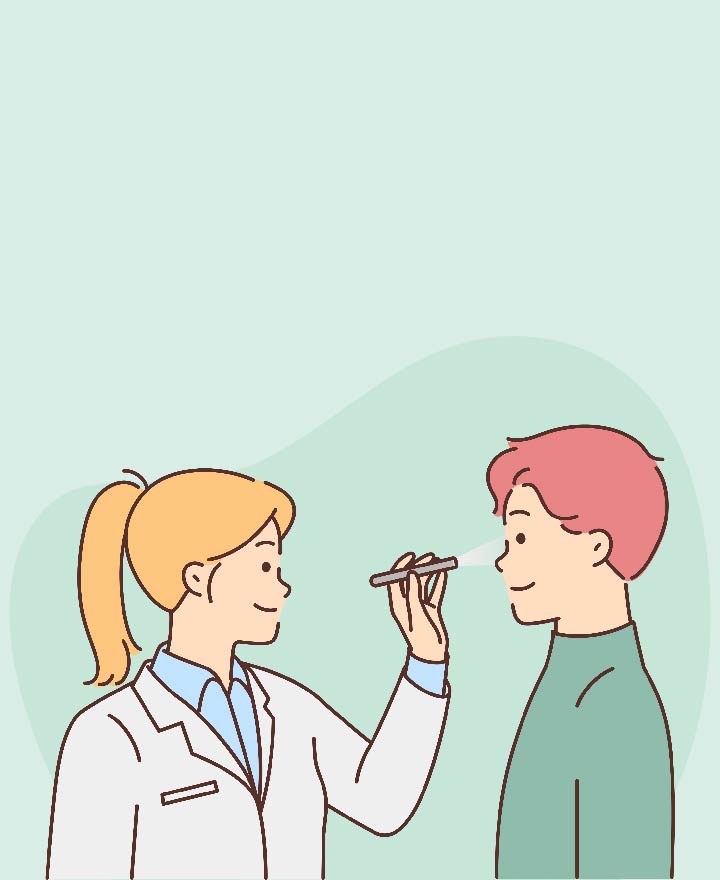

Glaucoma – Types, Symptoms and Causes
Glaucoma is a leading cause of blindness for people over 60 years old. January is National Glaucoma Awareness Month which aims to spread awareness about the disease. Take a look at the article to know more.
What is Glaucoma?
Glaucoma is a disease that damages your eye’s optic nerve. It usually happens when fluid builds up in the front part of your eye. That extra fluid increases the pressure in your eye, damaging the optic nerve. It’s the most common form of optic nerve damage leading to vision loss.
Types of Glaucoma
The 2 main types are:
1. Open-angle Glaucoma
This type is the most common and it occurs when resistance builds up in your eye’s drainage canals. The disease may go unnoticed for years because most people don’t have symptoms.
2. Closed-angle Glaucoma
Also called angle-closure or narrow-angle glaucoma, this rare type often comes on suddenly (acute). It occurs when either the angle between your iris and cornea is too narrow or when your pupil changes and becomes too big (dilated) too quickly. This blocks your drainage canals and prevents aqueous fluid from leaving your eye, causing eye pressure to rise. Symptoms include eye-pain and headaches, and it can be severe requiring immediate medical attention.
Less common types include:
1. Secondary Glaucoma:
This is when another condition like cataracts or diabetes causes added pressure in your eye.
2. Normal-tension Glaucoma:
This is when you have blind spots in your vision or your optic nerve is damaged although your eye pressure is within average range.
3. Pigmentary Glaucoma:
In this type, tiny bits of pigment from your iris get into the fluid inside your eye & clogs the drainage canals.
Symptoms
In case of open-angle glaucoma, most people don’t have symptoms. If symptoms do develop, they are usually late in the disease. That’s why glaucoma is often called the "sneak thief of vision." The main sign is usually loss of side,
or peripheral, vision.
On contrary, symptoms of angle-closure glaucoma usually come on faster and are more obvious. Damage can occur quickly. If you have any of these symptoms, seek medical care immediately:
• Seeing halos around lights
• Vision loss
• Redness in your eye
• Eye that looks hazy (particularly in infants)
• Upset stomach or vomiting
• Eye pain
Causes
The fluid inside your eye usually flows out through a mesh-like channel. If this channel gets blocked or the eye is producing too much fluid, the liquid builds up. This causes pressure inside the eye to rise, leading to damaging the optic nerve. The other causes of glaucoma include a blunt or chemical injury to your eye, severe eye infection, blocked blood vessels inside your eye, and inflammatory conditions.
Tips for living with Glaucoma
Glaucoma is a lifelong condition and needs continual follow-up with an ophthalmologist. But there are few things you can do to help keep your eyes healthy.
1. Regular physical activity may help lower eye pressure.
2. Eat health and well balanced diet.
3. Take your medication and drops regularly and as advised because missing meds could make your glaucoma worse.
4. Avoid or quit smoking
as it can increase your risk for diabetes and cataracts, both of which are risk factors for glaucoma.
5. Limit caffeine intake as too much of it can increase your eye pressure.
6. Wear protective eyewear.
7. Don’t rub
your eyes as scratching them can make things worse.
Conclusion
If you belong to a high-risk factor group for glaucoma, make sure to learn about its symptoms. There are multiple tests available for the diagnosis of this eye disease and its treatment involves lowering the pressure in your eyes. Even though there are no guaranteed measures available for glaucoma prevention, going on regular eye exams and following a healthy lifestyle can help with its management. One of the important components of our overall wellness is also being financially secured. Healthcare emergencies can happen any time, but a good health insurance policy can protect you from such uncertain situations. To know more about it, click here.
Source: Healthline, WebMD
Disclaimer: This blog provides general information and discussions about health and related subjects. The information and other content provided in this blog, website, or in any linked materials are not intended and should not be considered, or used as a substitute for, medical advice, diagnosis, or treatment. Kindly contact your doctor before starting a new medicine or health regime.
Related Articles
5 ways to keep your lungs healthy and whole
Age related hearing loss - causes & symptoms
10 Simple Ways to Take Care of Your Eyes
An Eye-Opener – Does Your Health Plan Cover Lasik?
Published on July 19, 2023

















 Health Insurance
Health Insurance  Travel Insurance
Travel Insurance  Car Insurance
Car Insurance  Cyber Insurance
Cyber Insurance  Critical Illness Insurance
Critical Illness Insurance
 Pet Insurance
Pet Insurance
 Bike/Two Wheeler Insurance
Bike/Two Wheeler Insurance  Home Insurance
Home Insurance  Third Party Vehicle Ins.
Third Party Vehicle Ins.  Tractor Insurance
Tractor Insurance  Goods Carrying Vehicle Ins.
Goods Carrying Vehicle Ins.  Passenger Carrying Vehicle Ins.
Passenger Carrying Vehicle Ins.  Compulsory Personal Accident Insurance
Compulsory Personal Accident Insurance  Travel Insurance
Travel Insurance  Rural
Rural